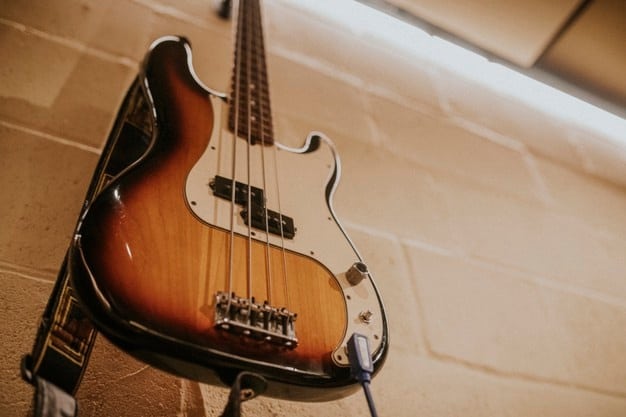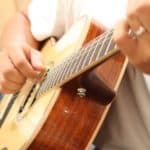Imagine this.
You practice, hone your skills, and finally enter a band.
Everything seems perfect, but all of a sudden, the bass player leaves and there’s an empty place that needs to be filled.
“You, the guitar guy”, the singer says, “you are our new bassist”.
But you never played bass guitar before! Now, what!?
Believe it or not, this has happened a lot, and even to famous musicians.
What would you do if this happened in real life? Would it be easy to transition from guitar to bass?
Switching from guitar to bass is rather easy. While the role of bass in a band is not the same as guitar, getting the hang of it won’t take too long. However, becoming a “real” bassist involves a deeper understanding of the instrument and its function within a band instead of a simple gear change.
Bass and guitar are similar, but the devil’s in the details.
Keep on reading if you want to learn what those details are about.
Can you just pick up a bass guitar and play if you are a guitarist?
Short answer: Yes, you can!
Still, there’s a big chance you’ll play the instrument “differently”.
Let’s see this example.
Lemmy Kilmister from Motörhead used to play guitar. However, the first time he picked a bass was at a concert with his band Hawkwind.
He learned to play bass on that live performance.
It was possible because he played it as if it were a guitar: Loud and with chords.
In the end, it turned out to be a good thing, because that style defined Motörhead’s sound.
Notice that this won’t be the norm for every band.
The majority of bass players “carry the band on their shoulders”, rather than being in the spotlight.
Such laws apply not only to the stage but to the overall sound of the band.
Because let’s be honest, the presence of bass most often than not gets overshadowed by guitar (…And Justice for All, I’m talking to you).
All in all, if your role as a bassist is to support the band by providing a steady rhythm, transitioning from guitar to bass will bring average results.
You will need to master bass individually for the band to work.
On the other hand, if your role is being a kind of second/another guitarist (as in Kyuss, Black Sabbath, Red Hot Chili Peppers), then simply switching might be more than enough.
What is different in a bass guitar?
Let’s begin with the obvious: Bass has fewer strings.
That is, of course, on standard bass guitars.
As a result, you‘ll lack the high E and B notes (standard tuning), which means that some specific chords will be impossible to emulate.
The pitch range of the instrument is another main difference. The bass plays an octave lower than guitars.
This characteristic leads to most bassists being in the supportive role of the band, providing the rhythmic and harmonic foundation.
Lastly, bass generally accentuates foundational notes, which means that you should be careful when filling in between root notes.
12 tips to make a smooth transition from guitar to bass
Although nothing is set in stone with music, and your very own transition quest will be unique, here are some tips that might help you in this journey:
1. Adapt to its size
Bass is bigger, larger, and strings much thicker. It will feel slightly off at the very beginning, but you’ll get used to it quickly.
2. Focus on the drums
Bass and drums are partners in crime. They are the masters of the rhythm.
If both stay tight to one another, a solid backbeat is guaranteed.
3. Make it simpler
Sometimes the less, the better.
Get used to playing enough, so you lead the rhythm with just the essentials.
Don’t add more notes for the sake of adding.
4. Walk that line out!
Walking bass lines connect notes. They are a transition from one root note to the other.
Master them if you want to be a bass master.
5. Fill in the gaps
There’s a time and place for everything. That includes the “fills”.
Adding extra notes between roots brings life to the song. However, bass guitars tend to be stricter with this technique.
It’s easier to ruin the groove when not playing them properly, compared to guitars.
6. Keep the chords!
Chords in bass sound magnificent. Play them from time to time, as if it were a guitar.
It will make you feel comfortable.
7. Put your pick away
Many bassists play with picks, but if possible, avoid it.
Just for a while.
Get used to playing with fingers. It will make a difference.
8. Sharpen your ears
Listen to the bass lines on your favorite songs, especially those you already learned on guitar.
Notice the contrast between instruments.
9. Ask for advice
Sounds obvious, isn’t it?
Not really! Many people forget that asking for help is a relevant part of any learning process.
Find professionals. See what they know that you don’t.
10. Take lessons
You’ll find more information on this below.
Spoiler alert: Take lessons and improvement is a guarantee.
11. Five minutes each
Play with your guitar for five minutes.
Then, take your bass, and play for another five minutes with it.
Notice the change. Notice the feel, and how you feel.
12. Wear gloves
Bass strings are thicker. Way thicker.
Fingers may hurt a lot, more than they did when playing guitar.
Gloves make the pain more bearable.
You could even play without them, and wear them after your blisters begin to appear.
How long can it take you to get used to it?
Unfortunately, there is no clear answer to this concern.
Bear in mind, though, that every instrument requires a time investment.
Getting the idea of the bass will take months or even weeks if you are already a guitarist.
However, it won’t stop there.
The more you play, the more you learn.
Does bass use the same music theory as guitar?
Music theory never changes.
Scales, harmony, notes, chords. All of them are the same for every instrument.
When reading a music sheet, though, you will have to learn the bass clef.
Bass clef is in charge of notating pitches below middle C.
It works with other instruments as well, such as cello, trombone, and tuba.
Would you need to take bass lessons if you already know how to play guitar?
You don’t have to take lessons to understand the basics of bass.
Practicing with a band and paying attention to music may be enough.
Naturally, you don’t want to be overly confident.
Take lessons not to learn how to play, but to learn how to play better.
There are hundreds of YouTube videos with lots of helpful information for free.
Private classes too are a good time investment.
An expert can guide you and provide tips on how to make a smoother transition from one instrument to the other.
Not to mention, a teacher can spot and correct all those mistakes you cannot see.
Taking lessons is highly encouraged.
Can you use your guitar amp to practice bass?
Guitar amps work on bass but only at low volume settings.
Otherwise, a higher volume might damage your gear.
For further information, we have a more detailed article which we encourage you to read.
You can find it here.
Final thoughts
Even though you play guitar, starting with a bass may move you back to the starting line.
Do not worry if you feel like a rookie. Not everyone responds the same way.
Make sure to transition only if you want it, and always, make sure you enjoy the process.

Hello there, my name is Ramiro and I’ve been playing guitar for almost 20 years. I’m obsessed with everything gear-related and I thought it might be worth sharing it. From guitars, pedals, amps, and synths to studio gear and production tips, I hope you find what I post here useful, and I’ll try my best to keep it entertaining also.





